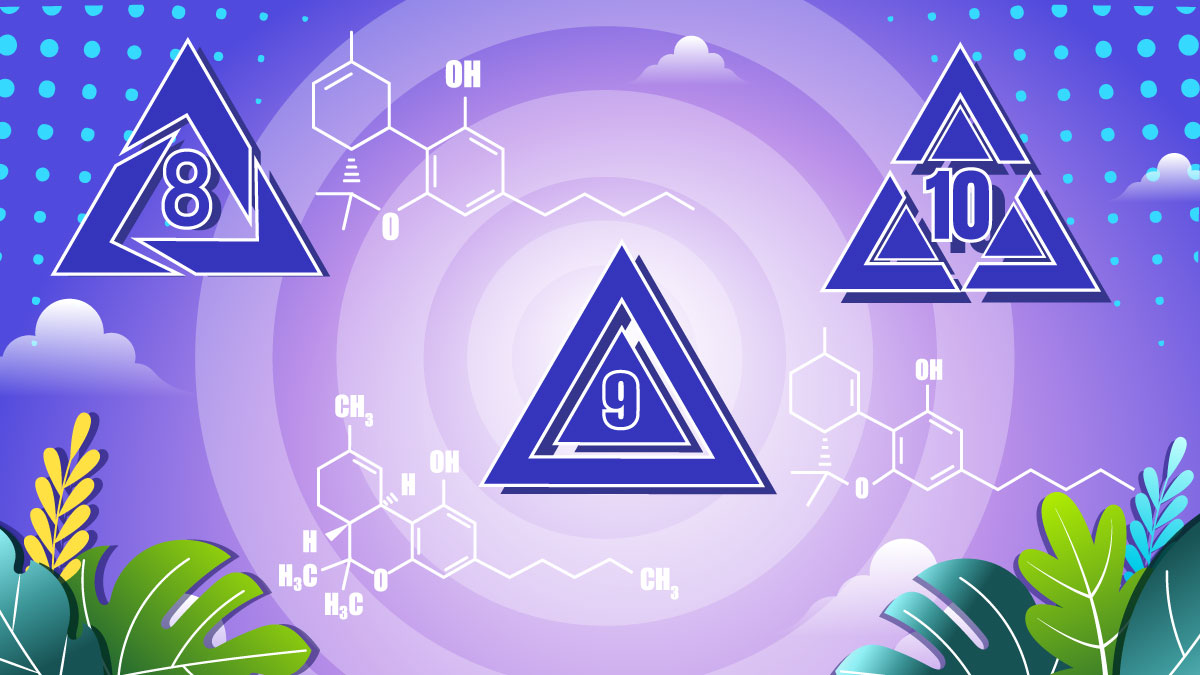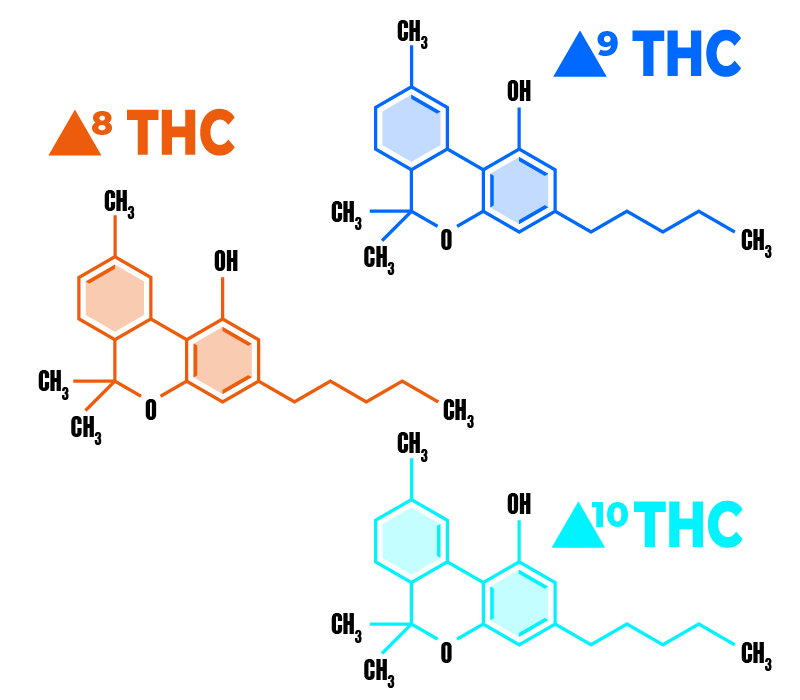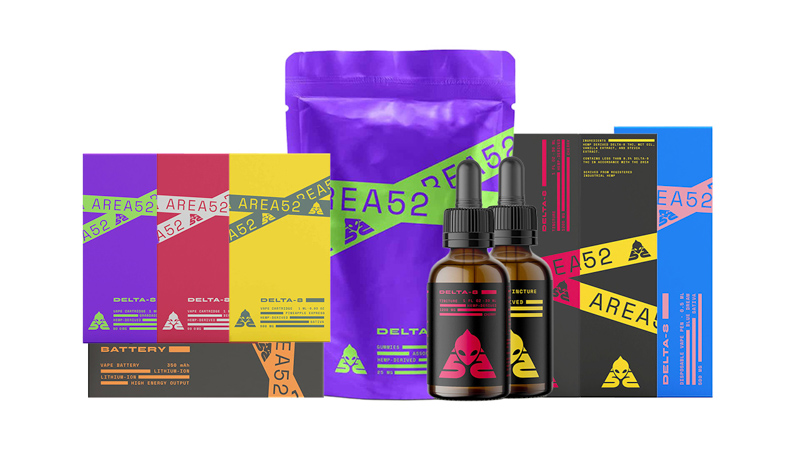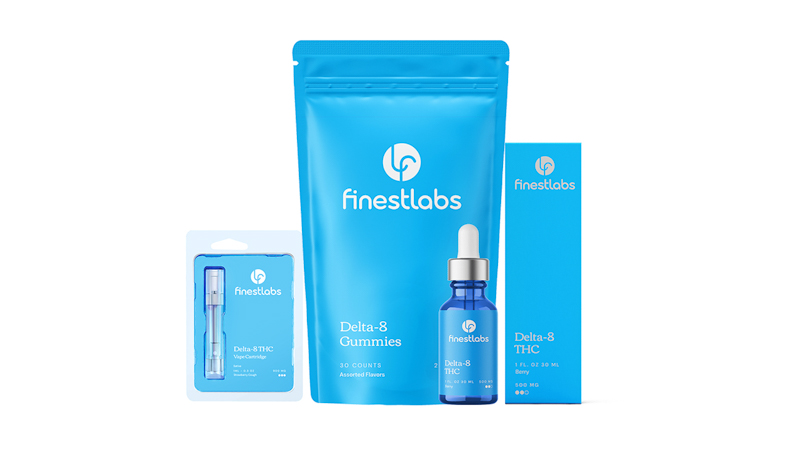Delta-8 vs. Delta-9 vs. Delta-10 THC: What’s the Difference?

This article looks closely at the differences between delta-8, delta-9, and delta-10 THC. All three compounds are analogs of the THC molecule, each having its unique benefits and potency. You’ll learn everything about the effects, uses, products, and risks of taking different THC isomers.
Isomers of THC are taking the cannabis industry by storm. A legal loophole unintentionally created by the 2018 Farm Bill and advancements in extraction methods legalized all versions of THC other than delta-9.
As long as delta-8 and delta-10 products come from hemp and contain less than 0.3% of delta-9 THC, they’re legal at the federal level.
But what exactly are THC isomers? How many are there? And most importantly, are they stronger than delta-9 THC?
That’s what we’ll cover in this article. We shed light on the main differences between delta-8, delta-9, and delta-10 THC — including their effects, potency, uses risks, and legal status.
Delta-8 vs. Delta-9 vs. Delta-10 THC (Summary)
- Delta-8, delta-9, and delta-10 are isomers of THC. They have similar molecular structures, but they produce slightly different effects due to subtle differences in their carbon bonding.
- All versions of THC can get you high because they interact with CB1 receptors in the brain.
- Delta-8 and delta-10 are less potent than delta-9 THC. This makes them good for beginner users.
- The effects of delta-8 are more mellow, while delta-10 THC is more motivating and energizing.
- You can still get anxious from taking too much delta-8 and delta-10 THC. Always start with low doses when introducing new cannabinoids to your body.
- Delta-9 THC is federally illegal, unlike hemp-derived delta-8 and delta-10 THC. However, several states have already banned delta-8 and delta-10 products.
What is Delta-8 THC?
Delta-8 THC belongs to a group of chemicals called isomers, which share a similar chemical structure. They’re made of the same atoms but in a slightly different arrangement.
When it comes to delta-8 THC, it has a double carbon bond located at the eighth chain, unlike delta-9, which has this bond at the ninth chain.
This difference takes away some of delta-8 THC’s potency. It doesn’t have such a strong binding affinity with the CB1 receptor as delta-9. The potency of delta-8 is about twice as low as that of delta-9 THC.
What is Delta-9 THC?
Delta-9 THC is the primary intoxicating compound in Cannabis. It forms when Cannabis is exposed to heat during drying, curing, storage, and decarboxylation (when you make edibles).
Delta-9 is the agonist of CB1 receptors; when it binds to them, it induces a set of euphoric sensations, such as mood elevation, laughter, increased appetite, altered perception of time, sharpened senses, and short-term memory changes.
Delta-9 THC is also the most abundant cannabinoid in cannabis plants. It’s cheaper to produce and available in more forms.
New users should be aware of THC’s biphasic nature. In low and moderate doses, delta-9 THC is a relaxant. But higher doses of this cannabinoid can backfire on you and elevate anxiety or trigger paranoia.
What is Delta-10 THC?
A relatively new cannabinoid to the hemp scene, delta-10 THC results from converting delta-9. Unlike other isomers, delta-10 produces more energizing and nootropic effects, making it a suitable option for daytime use.
Nootropic effects refer to how a plant-based substance affects our focus, thinking, and cognition in general.
However, research on delta-10 THC is in its early stages, so most of the evidence comes from anecdotal reports.
The potency of delta-10 is similar to delta-8 — 50% lower than delta-9 THC.
How Are Different Versions of THC Created?

Cannabis is the cannabinoid powerhouse. With so many compounds and different extraction methods, there’s a range of ways to alter the structure of certain cannabinoids, turning them into other cannabinoids.
For example, when you heat up THCA, you’ll end up with THC.
When you convert CBD using specialized acids and heavy metal regents, you’ll produce delta-8 THC.
Delta-10 THC follows a similar isomerization process.
These isomers all have similar-yet-different molecular structures. Delta-8 has a double carbon bond on the eighth chain; delta-9 has it on the ninth chain; delta-10 comes with a double bond on the… yes, the tenth chain.
All hemp-derived isomers of delta-9 THC are legal at the federal level, although there have been many controversies surrounding this subject recently.
CBD is also a compound derived from cannabis plants to dispel all doubts. It’s a popular cannabinoid because it offers a plethora of health benefits without the psychoactive effects of THC.
Because CBD works synergistically with other cannabis compounds, many manufacturers combine them into one product to increase their therapeutic potential.
What’s the Difference Between Delta-8 vs. Delta-9 vs. Delta-10 THC?
Delta-8, delta-9, and delta-10 have the same chemical formula but slightly different molecular structures — but you already know this.
This difference, however, creates other differences that affect your experience with each cannabinoid.
Here’s what you need to know.
How They Work
Delta-8, delta-9, and delta10 all activate the endocannabinoid receptors (CB1) in the brain and central nervous system (1).
However, their binding affinity with these receptors isn’t the same.
For example, delta-8 and delta-10 THC are weaker agonists of CB1 than delta-9, so they don’t get you as high.
Their effects are not only less intense, but they also come with a lower incidence of anxiety and paranoia — the two main reasons why some people avoid high-THC Cannabis.
Potential Benefits
Science hasn’t yet explored the benefits of delta-8 and delta-10 THC, but since they target the same receptors in the endocannabinoid system, their health benefits are also similar.
All versions of THC can help:
- Ease stress and anxiety (2)
- Reduce pain (3)
- Curb inflammation (4)
- Reduce nausea and vomiting (5)
- Promote neurogenesis (6)
- Regulate body temperature (7)
- Ease the symptoms of depression (8)
- Improve sleep (9)
Delta-9 is the most psychedelic variant, so it’s best suited for experienced users or individuals who can tolerate high doses of THC without getting anxious.
Delta-8 is called “diet weed” and induces a milder euphoria. The effects are more focused on the body, making the user lazy in large doses.
The effects of delta-10 THC lean towards focus, creativity, and energy. The psychoactive buzz is as potent as with delta-8 THC, but it’s definitely not as mellow.
Risks and Drawbacks

Since delta-9 THC is quite potent, you need to watch out for several side effects (10):
- Drowsiness
- Dry Mouth
- Euphoria
- Slurred speech
- Impaired motor coordination
- Anxiety
- Paranoia
- Rapid heart rate
- Lethargy
- Confusion
- Dizziness
- Headaches
Like delta-8, delta-10 THC hasn’t been studied for its safety, so the list of side effects is unknown. However, you may assume it produces similar adverse reactions — but with a lower risk of occurrence.
Uses
Delta-9 THC is most commonly found in dried cannabis flowers. Other popular forms include edibles, vapes, concentrates, and topicals.
Delta-8 and delta-10 THC are mainly available as vape carts, but you can also find them in tinctures and gummies.
All variants can be used recreationally or medicinally.
Price
Delta-9 THC products are the cheapest because they require the least processing. They’re also more available because delta-9 THC is the most popular cannabinoid.
Hemp-derived delta-8 THC is a bit more expensive. Not all manufacturers know how to extract it from hemp, and those who know don’t have great competition so far. This, in turn, results in higher prices.
Delta-10 THC follows a similar pattern. It’s the least popular isomer of THC. With no competition, little product diversity, and a lack of regulations, delta-10 products are less budget-friendly.
Legal Status
When talking about the legality of delta-9 THC, it is currently illegal at the federal level due to marijuana’s status as a Schedule I substance. Individual states have the right to regulate marijuana within their jurisdiction. So far, 18 states have legalized marijuana for recreational use, and 38 have medical marijuana programs for patients.
Delta-8 and delta-10 THC are theoretically legal at the federal level as long as they come from hemp and the final product contains less than 0.3% delta-9 THC. However, there have been some controversies around the manufacturing methods of these cannabinoids; the DEA called them synthetic tetrahydrocannabinols, insisting that the federal government does something about the current legal limbo.
However, the federal government left this problem up to the states. The situation is dynamic, so it’s best to check your local laws if you want to learn about the legal status of hemp-derived delta-8 and delta-10 THC in your state.
In What Ways Are Delta-8, Delta-9, and Delta-10 THC Similar?
First of all, delta-8, delta-9, and delta-10 are natural cannabis compounds. They also belong to the same family of tetrahydrocannabinols.
Despite differences in their psychoactivity, all three isomers can get you high, offering the same health benefits and a similar safety profile.
Another similarity between delta-8, delta-9, and delta-10 is that you can’t fatally overdose on them. Cannabinoids don’t interfere with the brainstem region that controls respiratory functions, so it’s impossible to die from taking too much. You’d need to take 40,000 times the amount that gets you high to leave this realm.
Delta-8 vs. Delta-9 vs. Delta-10 THC: Which One is Better for You?
The different types of high created by delta-8, delta-9, and delta-10 THC make them better for different occasions.
When to Use Delta-8
Delta-8 THC is a good pick for users aiming at a mild high. If you’re sensitive to the psychedelic nature of THC, delta-8 can help you avoid the discomfort associated with high doses of delta-9. It also comes with a greater body load, so you may find it better for evening use.
When to Use Delta-9
If you want a strong high and experience the signature effects of marijuana, delta-9 is your best bet.
THC is most commonly used for its medicinal benefits, such as pain relief, anxiety reduction, and improved sleep.
Depending on the strain, product type, dosage, and tolerance, you can use delta-9 in the morning and in the evening.
When to Use Delta-10
Delta-10 is another decent option for a mild high. However, unlike delta-8 THC, its effects are more stimulating, energizing, and motivating due to its nootropic nature.
Best Delta-8 THC Products
Delta-8 THC is by far the most available psychoactive cannabinoid of that trinity.
It’s legal at the federal level, and more people are aware of its presence than delta-10 THC.
However, not all delta-8 THC products are created equal. If you want to ensure you’re making a well-thought-out decision, you should look for a reputable company that provides batch-specific lab reports for the purity and potency of their products.
If you don’t have time to read certificates of analysis and comb through customer reviews, here are our top 2 picks that offer the best value for money.
1. Area 52

Get 15% off all Area 52 products. Use code “CFAH” at checkout.
| Pros | Cons |
|
|
Area 52 offers premium delta-8 THC products made from pure distillate. The company’s line-up includes tinctures, vape carts, gummies, and pre-rolled joints. The pre-rolls and vape carts are available in different strains, allowing you to tailor the experience to your preferences.
These products are made from organic hemp, extracted with CO2, and triple-tested in an independent laboratory for potency and purity.
Area 52 is known for the high terpene content of their products, contributing to the entourage effect and providing delicious, natural flavors.
2. Finest Labs

| Pros | Cons |
|
|
Finest Labs takes the scientific approach to cannabinoids, offering a humble selection of hemp-derived delta-8 THC products. Despite a modest range, Finest Labs focuses on mastering their classic formulas, including vape carts, gummies, and tinctures.
Similar to Area 52, Finest Labs provides relevant certificates of analysis from a third-party laboratory regarding their phytochemical content and purity.
The company also offers an impressive selection of terpenes from Cannabis and other plants. You can use them to create your own blends and infuse them into products like tinctures, edibles, and DIY vape carts.
Can Delta-8 and Delta-10 THC Make You Fail a Drug Test?
Yes, both delta-8 and delta-10 THC can make you fail a drug test. That’s because workplace drug tests aren’t designed to distinguish between different isomers of THC. They look for THC-COOH — a metabolite that’s the same across all variants.
If you know of an upcoming drug test at work, it’s best to abstain from using delta-8, delta-9, and delta-10 THC. It’s a good opportunity to take a T-break and reduce your tolerance by a few levels.
Key Takeaways on the Differences Between Delta-8, Delta-9, and Delta-10 THC
Delta-8, delta-9, and delta-10 THC are different variants of the THC molecule.
Although they share the same formula, their molecular structure is a bit different, giving them unique properties and different levels of psychoactivity.
Delta-9 is the strongest version; it’s best used in small doses or by experienced users who can handle larger amounts without getting anxious or paranoid.
If you’re looking for a milder high that pairs well with an evening chill, delta-8 THC may come in handy.
For a productive buzz, choose delta-10 THC products. But regardless of your choice, make sure you get them from a trusted source that provides relevant lab reports for purity.
Sources:
- Zou, S., & Kumar, U. (2018). Cannabinoid Receptors and the Endocannabinoid System: Signaling and Function in the Central Nervous System. International journal of molecular sciences, 19(3), 833. [1]
- Sarris, J., Sinclair, J., Karamacoska, D., Davidson, M., & Firth, J. (2020). Medicinal Cannabis for psychiatric disorders: a clinically-focused systematic review. BMC psychiatry, 20(1), 24. [2]
- Bains S, Mukhdomi T. Medicinal Cannabis For Treatment Of Chronic Pain. [Updated 2022 Apr 4]. In: StatPearls [Internet]. Treasure Island (FL): StatPearls Publishing; 2022 Jan-. [3]
- Nagarkatti, P., Pandey, R., Rieder, S. A., Hegde, V. L., & Nagarkatti, M. (2009). Cannabinoids as novel anti-inflammatory drugs. Future medicinal chemistry, 1(7), 1333–1349. [4]
- Parker, L. A., Rock, E. M., & Limebeer, C. L. (2011). Regulation of nausea and vomiting by cannabinoids. British journal of pharmacology, 163(7), 1411–1422. [5]
- Prenderville, J. A., Kelly, Á. M., & Downer, E. J. (2015). The role of cannabinoids in adult neurogenesis. British journal of pharmacology, 172(16), 3950–3963. https://doi.org/10.1111/bph.13186
- Hanna, J. M., Strauss, R. H., Itagaki, B., Kwon, W. J., Stanyon, R., Bindon, J., & Hong, S. K. (1976). Marijuana smoking and cold tolerance in man. Aviation, space, and environmental medicine, 47(6), 634–639.
- Martin, E. L., Strickland, J. C., Schlienz, N. J., Munson, J., Jackson, H., Bonn-Miller, M. O., & Vandrey, R. (2021). Antidepressant and Anxiolytic Effects of Medicinal Cannabis Use in an Observational Trial. Frontiers in psychiatry, 12, 729800. https://doi.org/10.3389/fpsyt.2021.729800
- Walsh, J. H., Maddison, K. J., Rankin, T., Murray, K., McArdle, N., Ree, M. J., Hillman, D. R., & Eastwood, P. R. (2021). Treating insomnia symptoms with medicinal Cannabis: a randomized, crossover trial of the efficacy of a cannabinoid medicine compared with placebo. Sleep, 44(11), zsab149. https://doi.org/10.1093/sleep/zsab149
- LaFrance, E.M., Stueber, A., Glodosky, N.C. et al. Overbaked: assessing and predicting acute adverse reactions to Cannabis. J Cannabis Res2, 3 (2020). https://doi.org/10.1186/s42238-019-0013-x